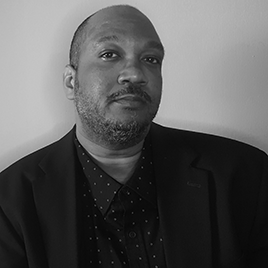When the pickup truck, with its side mirror,
almost took out my arm, the driver’s grin
reflected back; it was just a horror
show that was never going to happen,
don’t protest, don’t bother with the police
for my benefit, he gave me a smile—
he too was startled, redness in his face—
when I thought I was going, a short while,
to get myself killed: it wasn’t anger
when he bared his teeth, as if to caution
calm down, all good, no one died, ni[ght, neighbor]—
no sense getting all pissed, the commotion
of the past is the past; I was so dim,
he never saw me—of course, I saw him.
Copyright © 2020 by Tommye Blount. Originally published in Poem-a-Day on February 19, 2020 by the Academy of American Poets.
“Love, of course, the sonnet was built for little songs of love, but its power also resides in how it can force one to negotiate the tensions between two opposed entities (moods, places, people, etc.) in such a small amount of space; in such a short amount of time. Time, yes, but also history is the engine powering this poem. History, and I do mean American history, is rife with accounts of marginalized people forced—either through violence or some other trickery just shy of illegality—to make room for white people and whiteness. The event in this poem happened to me a day before I started writing it, in my hometown of Detroit. And, no, it wasn’t that long ago.”
—Tommye Blount

